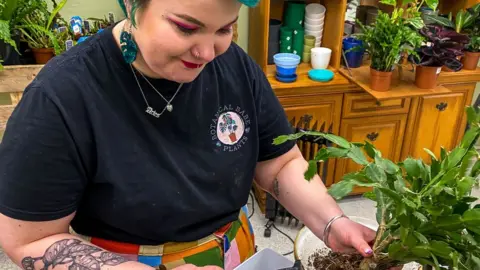Business: Student entrepreneurs need more support, academic says
Young entrepreneurs should be given more support to work for themselves, according to a leading academic.
Prof Dylan Jones-Evans, an entrepreneurship expert, said more students and graduates were seeking self-employment and need help to do so.
Tesni Boughen, 24, left college studies to open a pop-up plant shop, saying she had to take a "massive risk".
Economy Minister Vaughan Gething said start-ups would be "instrumental" to the post-pandemic economy.
"It was only meant to be for like two months and then two years later we're still here, selling plants and not doing my master's anymore," Tesni said.
She said she had always tinkered with houseplants, never thought she would have the opportunity to turn her hobby into a job.
When her studies were suspended at the start of the pandemic, she began selling cuttings of plants online, keeping stock in her mum's conservatory.
Initial sales were so good she used her £2,000 final-term student loan to place a wholesale order.

"I thought if I don't make my money back, I can't go back to uni anyway," she said.
The former post-graduate loved the pop-up so much, she made it permanent and dropped out of her studies.
After falling into business because of the pandemic, she said she now gives advice to other aspiring entrepreneurs who need support.
"The forms are so complicated and if you make one mistake the grant is gone," she explained.

Prof Jones-Evans said offering guidance, support and mentoring to student and graduate business was vital to make the most of the post-pandemic economy.
"As we come out of Covid there are so many opportunities," he said. "The important thing now is for universities to appreciate that and to provide the support necessary to make this happen."
The academic founded Start-Up Stiwdio at the University of South Wales, offering advice, idea development and business boot camps at its campus in Treforest, Rhondda Cynon Taf.
 Dylan Jones-Evans
Dylan Jones-EvansHe acknowledged investors can be nervous about businesses started by young people, seeking instead more experienced owners.
But he argued they need to work with young entrepreneurs.
"They [young people] understand what new markets actually need... far more than people in their forties or fifties," he said.
"So as these new markets grow and as these new markets expand you find they are in the perfect position to understand what the customer needs."
The professor of entrepreneurship added one of the biggest challenges young entrepreneurs face is finance.
But, in his experience, small amounts in the region of £15,000 can make a big difference.
Jake Spanswick is one of those who benefited from a loan.
He is the co-founder of a virtual-reality training company working in biotechnology and life sciences.
"We've been operating for about 12 months now... and we're currently fundraising and got a valuation for £2m," he said.
The 26-year-old admitted it can be "scary" running your own business, adding the company would not be where it is now without the help of the University of South Wales.
He said the idea for the business, which allows people to access a virtual laboratory through a headset, was developed during the pandemic as friends complained they could not access labs and gain experience.
The funding they received allowed them to travel to San Francisco in March to expand their network, as well as buy new equipment.
He added there "really needs to be a push at the minute for more innovation, people sometimes think there's a lack of ideas, but they are all out there".
Re-design our economy
In June, the Welsh government announced a £5m commitment to "foster new culture of entrepreneurialism among young people in Wales".
Help will include a new start-up grant for young people of up to £2,000 per business, one-to-one business advisory support and entrepreneur mentoring.
Vaughan Gething said encouraging young people to launch businesses would be "instrumental as we re-design our economy post-coronavirus".
More consistent offer
The Higher Education Funding Council for Wales (HEFCW) said this was "a major area of strength" for Wales.
"In 2020/21 Welsh institutions accounted for 16.8% of graduate start-ups in the UK which have been active for three or more years, this is far higher than the nominal 5% share usually used to represent Wales," it added.
HEFCW said it helped fund Start-up Stiwdio, as well as running the Research Wales Innovation Fund, which provides £15 million a year to support universities here.
Universities Wales (UW), which represents the country's nine universities, said "we can be proud... to have the highest proportion of graduate start-ups per capita in the UK".
There is always more than can be done, said chair Prof Elizabeth Treasure, including providing a "more consistent offer, and to build further links with local businesses that can help start-ups".
